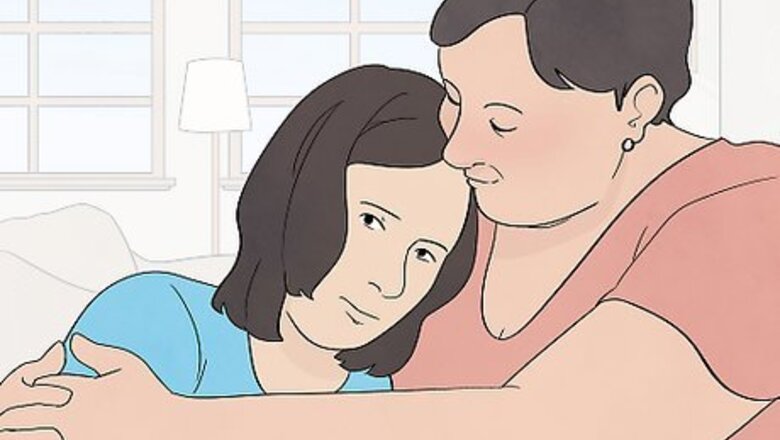
views
- A codependent parent has an unhealthy attachment to their child and tries to control the child's life and behavior as a result of that attachment.
- Codependent parents find their self-worth in caring for their children, so they have difficulty enforcing boundaries and are overly involved in their children's lives.
- Heal from a codependent relationship by establishing healthy boundaries and practicing self-care. Individual or group therapy can also be helpful.
What is a codependent parent?
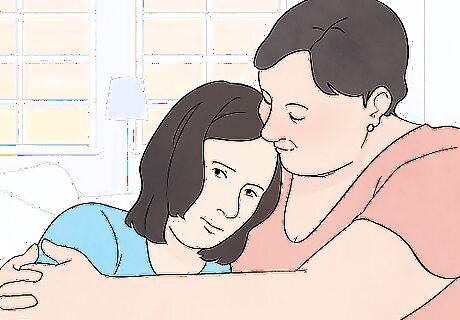
A codependent parent has an unhealthy attachment to their child. Because of this unhealthy attachment, the parent puts the child's needs ahead of their own and finds their self-worth in attending to the child. They may also try to control the child's behavior so the child only does what they want. Codependency is a learned behavior—it's not a mental disorder or something inherent. This also means it can be overcome with awareness and attention.
Signs of Parent Codependency

Controlling behavior A codependent parent is typically very controlling of their child and their child's behavior. They want their child to do exactly what they want, when they want, how they want. But unlike other types of controlling parents, a codependent parent will blame themselves if their child doesn't do what they want. A codependent parent might be very strict about things that would seem completely arbitrary to anyone else. If their child doesn't do what they want, they'll feel as though they've failed as a parent.

Sacrificing other relationships A codependent parent gets their self-worth and self-validation from their relationship with their child, which means that all other relationships could potentially fall by the wayside. The child comes first, and anyone else who gets in the way of that could potentially be alienated by the codependent parent. For example, a codependent parent might ignore their spouse to attend to their child, even if their child didn't really need their help.

Having difficulty setting or enforcing boundaries Typically, the roles of parent and child are clearly defined. But a codependent parent doesn't like to have strong boundaries because this might mean upsetting or disappointing the child, which would destroy the codependent parent's sense of self-worth. They allow their children to do things other parents might not allow, and might even cover for the child after the fact so the child doesn't have to face the consequences of their actions. Another aspect of this is parentification, where the codependent parent expects their child to care for their emotional well-being or take on more adult responsibilities. For example, a codependent parent might complain to their child about an adult relationship they're in and expect the child to comfort them.

Being overly involved in the child's life Because the codependent parent feels like their entire self-worth is wrapped up in their child, they're typically going to be deeply involved in everything the child does. Part of it is because they want to control the child, but it's also because they want to have a hand in everything so the child sees how important that parent is. For example, if the child decides they want to play soccer, the codependent parent might become one of the coaches of the team so they can be involved at every game and every practice—not because they have knowledge of the sport and can actually help.
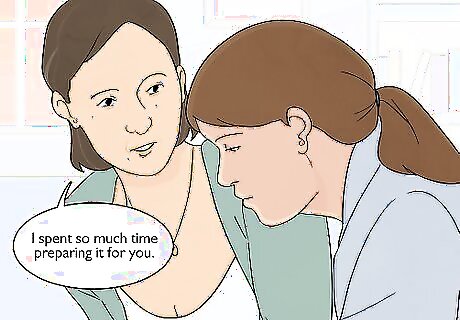
Manipulating the child's emotions Codependent parents often use psychological manipulation, such as guilt trips, projection, and passive aggression, to exert control over their child and get the child to do whatever they want. In some cases, the codependent parent might not even be aware that they're doing this. They simply believe that they're always right and that they know what's best—if the child disagrees, the codependent parent will make the child feel bad for disagreeing with them. For example, if the parent makes dinner and the child doesn't want to eat what was cooked, the parent might try to make the child feel guilty by telling them how long they spent preparing the food or how much money they spent on it.

Inappropriate caretaking of the child A codependent parent takes care of a child in ways that aren't age-appropriate and usually goes way overboard in terms of coddling their child. To some extent, it's because they want the child to be dependent on them and to feel as though they can't do things on their own. The codependent parent also fears their child being independent and able to do things for themselves because then they won't need that parent anymore. For example, a codependent parent might continue to pick out and prep the child's clothes for school each day, even when the child is old enough to do that for themselves.

Shouldering too much of the blame A codependent parent is going to take the blame for anything that happens with the child, even when it likely has nothing to do with them. If the child gets in trouble, the codependent parent will blame themselves and do everything they can to shield the child from any real consequences for their actions. For example, if the child gets in trouble at school, a codependent parent would believe that the child was having problems because they were a failure as a parent. They might even transfer the child to another school so the child could avoid the consequences.
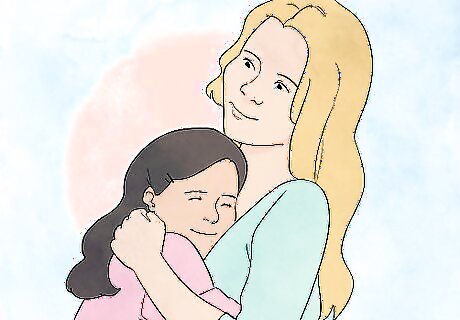
Tying self-esteem to the child's feelings A codependent parent tends to externalize their value, so their self-esteem depends on how their child feels about them. As long as their child loves them and needs them, they feel okay. But if their child is upset with them or tries to assert their independence, the codependent parent can start to feel as though they're worthless. Codependent parents may react to these feelings by making their child feel guilty or by doing things to ensure that their child continues to need them. For example, if the child goes away to college, the codependent parent might buy or rent an off-campus apartment that their child can't afford so they have to depend on the parent to pay the bills.

Responding with denial of any issues For a codependent parent, denial is a defense mechanism that keeps them from admitting that there are any problems. Actually admitting there are problems is a difficult and potentially scary thing to do, so the codependent parent protects themselves by denying that any problem exists at all. This denial applies to both codependency itself and any problems that their child might have. A codependent parent will likely enable their child and prevent them from feeling the consequences of their actions so they can continue to live in denial that there's a problem.
Healing from a Codependent Relationship

Identify and accept the issue. Because denial runs so strong with codependent parents, healing the relationship won't get very far until everyone involved is willing to recognize the problems they have and accept them for what they are. This is true whether you're a codependent parent or the child of a codependent parent. If you're the child of a codependent parent, take the time to sit down and talk to them. Help them understand that you love them and accept them but that the relationship as it exists is unhealthy.

Establish healthy boundaries. Codependent parents have difficulty setting and enforcing boundaries. Without strong boundaries, the parent and the child can't develop a healthy relationship. This is often something that the parent and the child will have difficulty doing on their own and might need help from a counselor or therapist. Both parent and child need to get comfortable expressing their feelings and their needs to each other. It can take time to understand how to embody the role of parent or child in a healthy way. For example, the child might set boundaries regarding what they can do for themselves so the parent doesn't continue to go overboard doing things for them.

Practice self-care. For both the codependent parent and their child, self-love starts with self-care. Children of codependent parents often externalize their self-esteem just as their parents did. This is a learning process that takes time, but if you treat yourself with care you'll start to look at yourself differently and develop a stronger sense of self-worth. Starting meditation or journaling can help you get in touch with your emotions and learn to manage and control them better, whether you're the parent or the child. If you're a codependent parent, self-care will help you develop a true sense of self-love so that you can overcome codependency and build a healthier relationship with your child.

Build a strong, supportive social network. Codependent parents tend to alienate other relationships in favor of their relationship with their child. Children of codependent parents, too, might feel as though they've placed other relationships on the back burner because of their parents. A strong network of friends and family who care can help you recover yourself and heal from the trauma of a codependent parent relationship. Reach out to friends and family members who seem to have your best interests at heart and who care for you for who you are as a person. Let them know about the situation that you're dealing with and that you need their help. Keep people around you who want to help you realize your own self-worth and aren't going to excuse or enable any unhealthy tendencies you might have.

Seek out group or individual therapy. Therapy is beneficial for both the codependent parent and the child, especially if they're trying to build a healthier relationship. Family therapy together can also be helpful if they're struggling to communicate and resolve old issues. Similarly, joining a group of others who've been in a parent-child relationship with the same dynamic can help both of them see that they're not alone. It can be really helpful to talk to other people who've been through the same things that you have, especially in a controlled group setting. Therapists and counselors can help you navigate and heal past trauma so that you can form healthy relationships.
Causes of Parent Codependency

The parent grew up with excessively controlling parents. Someone who grows up with excessively controlling parents might come to believe that they need the same level of control with their own children. Even if they rebelled against it, they might still feel as though it benefited them in some way and they want to pass on those benefits to their child.

The parent grew up with a parent struggling with addiction. The term codependency has its origins in alcohol and drug addiction, so it's common for people who grow up around addiction to develop codependent tendencies. Often, they had to grow up too soon and take on some adult responsibilities as a result of their parent's addiction. This pattern of excusing and taking care of their parent can carry over to their relationship with their children.
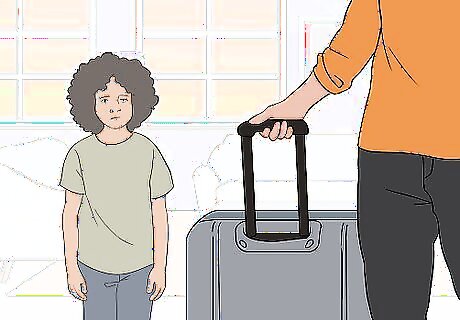
The parent felt both abandoned and controlled in their childhood home. This contradiction can cause parents to develop codependent behavior patterns with their own children. They don't want their children to feel abandoned so they become involved in every aspect of their children's lives and try to do everything for them. Because they're doing everything for the child, they feel entitled to control the child's behavior as well.
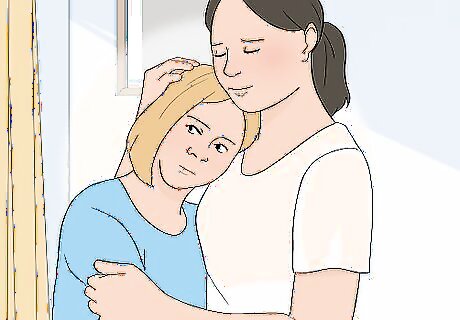
The parent had a codependent parent. Since codependency is a learned behavior, a parent with a codependent parent can learn this behavior pattern directly. As a child, they look to their parents to learn how to deal with emotions and relate to other people. When they're modeling a codependent parent, it becomes easy to fall back on those same behavior patterns when dealing with their own children. Codependent parents who also had a codependent parent might not even realize that their pattern of behavior is unhealthy and unfair to their child. For them, this is the only style of parenting that they know.

The parent grew up in a dysfunctional family. In a dysfunctional family, denial is the name of the game. Rather than deal with problems, the family as a whole sweeps the problems under the rug and pretends they don't exist. As a result, someone growing up in this environment can develop codependent patterns of behavior that they carry over into their relationship with their own children.
















Comments
0 comment